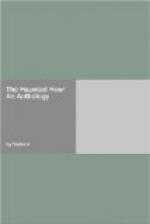He turned; he spurred him Westward; he did not know
who stood
Bowed with her head o’er the musket, drenched
with her own red blood!
Not till the dawn he heard it, and slowly blanched
to hear
How Bess, the landlord’s daughter,
The
landlord’s black-eyed daughter,
Had watched for her love in the moonlight, and died
in
the darkness there.
9
Back, he spurred like a madman, shrieking a curse
to the sky,
With the white road smoking behind him, and his rapier
brandished high!
Blood-red were his spurs i’ the golden moon;
wine-red
was his velvet coat;
When they shot him down on the highway,
Down
like a dog on the highway,
And he lay in his blood on the highway, with the bunch
of lace at his throat.
* * * * *
And still of a winter’s night, they say,
when the wind is in the trees, When the moon
is a ghostly galleon tossed upon cloudy seas,
When the road is a ribbon of moonlight over the
purple moor, A highwayman comes riding—
Riding—riding—
A highwayman comes riding, up to the old inn-door.
10
Over the cobbles he clatters and clangs in the
dark inn-yard; And he taps with his whip on
the shutters, but all is
locked and barred;
He whistles a tune to the window, and who should
be waiting there But the landlord’s black-eyed
daughter,
Bess,
the landlord’s daughter,
Plaiting a dark red love-knot into her long black
hair.
THE BLUE CLOSET: WILLIAM MORRIS
THE DAMOZELS
Lady Alice, Lady Louise,
Between the wash of the tumbling seas
We are ready to sing, if so you please;
So lay your long hands on the keys;
Sing
“Laudate pueri.”
And ever the great bell overhead Boom’d in the wind a knell for the dead, Though no one toll’d it, a knell for the dead.
LADY LOUISE
Sister, let the measure swell
Not too loud; for you sing not well
If you drown the faint boom of the bell;
He
is weary, so am I.
And ever the chevron overhead Flapp’d on the banner of the dead; (Was he asleep, or was he dead?)
LADY ALICE
Alice the Queen, and Louise the Queen,
Two damozels wearing purple and green,
Four lone ladies dwelling here
From day to day and year to year;
And there is none to let us go;
To break the locks of the doors below,
Or shovel away the heap’d-up snow;
And when we die no man will know
That we are dead; but they give us leave,
Once every year on Christmas-eve,




